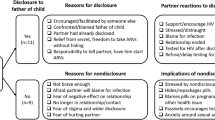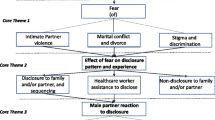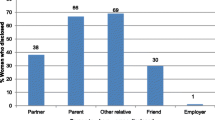Abstract
Disclosure of HIV status is widely promoted in the prevention of mother-to-child transmission (PMTCT), but a number of context-specific factors may mediate disclosure outcomes. To better understand HIV-disclosure dynamics, we conducted in-depth interviews among 62 HIV-positive pregnant women accessing PMTCT services in Durban, South Africa. Transcripts were coded for emergent themes and categories. Thirty-nine women (63 %) had been recently diagnosed with HIV; most (n = 37; 95 %) were diagnosed following routine antenatal HIV testing. Forty-two women (68 %) reported unplanned pregnancies. Overall, 37 women (60 %) reported an unintended pregnancy and recent HIV diagnosis. For them, 2 life-changing diagnoses had resulted in a double-disclosure bind. The timing and stigma surrounding these events strongly influenced disclosure of pregnancy and/or HIV. PMTCT-related counseling must be responsive to the complex personal implications of contemporaneous, life-changing events, especially their effect on HIV-disclosure dynamics and, ultimately, on achieving better maternal mental-health outcomes.
Similar content being viewed by others
Notes
Due to data-quality issues with the fertility section of the 2003 SADHS, the 1998 survey figures are reported. However, the 2003 SADHS reported unintended pregnancy trends similar to those of the 1998 SADHS.
References
UNAIDS. Opening up the HIV/AIDS epidemic: guidance on encouraging beneficial disclosure, ethical partner counselling & appropriate use of HIV case-reporting. Geneva: UNAIDS/WHO; 2000.
WHO. Testing and counselling for prevention of mother-to-child transmission of HIV support tools. Geneva: WHO; 2006.
Grinstead OA, Gregorich SE, Choi KH, Coates T. Voluntary HIV-1 counselling and testing efficacy study group. Positive and negative life events after counselling and testing: the voluntary HIV-1 counselling and testing efficacy study. AIDS. 2001;15(8):1045–52.
King R, Katuntu D, Lifshay J, Packel L, Batamwita R, Nakayiwa S, et al. Processes and outcomes of HIV serostatus disclosure to sexual partners among people living with HIV in Uganda. AIDS Behav. 2008;12:232–43.
Pennebaker JW, Colder M, Sharp LK. Accelerating the coping process. J Pers Soc Psychol. 1990;58(3):528–37.
Sheon NM. Sacraments of surveillance: ethnography of an HIV test clinic. Berkeley: University of California; 1999.
Chaudoir SR, Fisher JD, Simoni JM. Understanding HIV disclosure: a review and application of the Disclosure Processes Model. Soc Sci Med. 2011;72(10):1618–29.
Hult JR, Wrubel J, Branstrom R, Acree M, Moskowitz JT. Disclosure and nondisclosure among people newly diagnosed with HIV: an analysis from a stress and coping perspective. AIDS Patient Care STDS. 2012;26(3):181–90.
Desgrées du Loû A. The couple and HIV/AIDS in sub-saharan Africa: telling the partner, sexual activity and childbearing. Population-E. 2005;60(3):179–98.
Bairan A, Taylor GAJ, Blake BJ, Akers T, Sowell R, Mediola R. A model of HIV disclosure: disclosure and types of social relationships. J Am Acad Nurse Pract. 2007;19:242–50.
Derlega VJ, Winstead B, Greene K, Serovich J, Elwood WN. Reasons for HIV disclosure/nondisclosure in close relationships: testing a model of HIV-disclosure decision making. J Soc Clin Psych. 2004;23(6):747–67.
Fekete EM, Antoni MH, Duran R, Stoelb BL, Kumar M, Schneiderman N. Disclosing HIV serostatus to family members: effects on psychological and physiological health in minority women living with HIV. Int J Behav Med. 2009;16:367–76.
Kalichman SC, DiMarco M, Austin J, Luke W, DiFonzo K. Stress, social support, and HIV-status disclosure to family and friends among HIV-positive men and women. J Behav Med. 2003;26(4):315–32.
Maman S, Medley A. Gender dimensions of HIV status disclosure to sexual partners: rates. Geneva: Barriers and Outcomes; 2004.
Visser MJ, Neufeld S, de Villiers A, Makin JD, Forsyth BWC. To tell or not to tell: South African women’s disclosure of HIV status during pregnancy. AIDS Care. 2008;20(9):1138–45.
South African Department of Health. National HIV and syphilis prevalence survey, South Africa 2011. Pretoria: Department of Health; 2012.
Bucagu M, Bizimana Jde D, Muganda J, Humblet CP. Socio-economic, clinical and biological risk factors for mother-to-child transmission of HIV-1 in Muhima health centre (Rwanda): a prospective cohort study. Arch Public Health. 2013;71(1):4.
Jasseron C, Mandelbrot L, Dollfus C, Trocme N, Tubiana R, Teglas JP, et al. Non-disclosure of a pregnant woman’s HIV status to her partner is associated with non-optimal prevention of mother-to-child transmission. AIDS Behav. 2013;17(2):488–97.
Desgrées du Loû A, Brou H, Traore AT, Djohan G. From prenatal HIV testing of the mother to prevention of sexual HIV transmission within the couple. Soc Sci Med. 2009;69:892–9.
Groves AK, Maman S, Msomi S, Makhanya N, Moodley D. The complexity of consent: women’s experiences testing for HIV at an antenatal clinic in Durban, South Africa. AIDS Care. 2010;22(5):538–44.
Department of Health, Medical Research Council, ORC Macro. South Africa demographic and health survey 1998. Calverton: Department of Health, MRC and ORC Macro; 1998.
Rochat TJ, Richter LM, Doll HA, Buthelezi NP, Tomkins A, Stein A. Depression amongst pregnant rural South African women undergoing HIV testing. JAMA. 2006;295(12):1376–8.
Walsh D. The hidden experience of violence during pregnancy: a study of 400 pregnant Australian women. Aust J Primary Health. 2008;14(1):97–105.
Fawole AO, Hunyinbo KI, Fawole OI. Prevalence of violence against pregnant women in Abeokuta, Nigeria. Aust NZ J Obstet Gynaecol. 2008;48(4):405–14.
Maman S, Mbwambo JK, Hogan NM, Kilonzo GP, Campbell JC, Weiss E, et al. HIV-positive women report more lifetime partner violence: findings from a voluntary counseling and testing clinic in Dar es Salaam, Tanzania. Am J Public Health. 2002;92(8):1331–7.
DeMatteo LM, Goldie R, King SM, Wells LM. The “family” context of HIV: a need for comprehensive health and social policies. AIDS Care. 2002;14:261–78.
Gaillard P, Melis R, Mwanyumba F, Claeys P, Muigai E, Mandaliya K, et al. Vulnerability of women in an African setting: lessons for mother-to-child HIV transmission prevention programmes. AIDS. 2002;16(6):937–9.
Kilewo C, Massawe A, Lyamuya E, Semali I, Kalokola F, Urassa E, et al. HIV counselling and testing of pregnant women in sub-Saharan Africa. J AIDS. 2001;28:458–62.
Maman S, Mbwambo JK, Hogan NM, Weiss E, Kilonzo GK, Sweat MD. High rates and positive outcomes of HIV-serostatus disclosure to sexual partners: reasons for cautious optimism from a voluntary counseling and testing clinic in Dar es Salaam, Tanzania. AIDS Behav. 2003;7(4):373–82.
Corbin J, Strauss A. Basics Of qualitative research: techniques and procedures for developing grounded theory. 3rd ed. London: Sage Publications; 2008.
Myer L, Mlobeli R, Cooper D, Smit J, Morroni C. Knowledge and use of emergency contraception among women in the Western Cape province of South Africa: a cross-sectional study. BMC Women’s Health. 2007;7(14). doi:10.1186/472-6874-7-14.
Pettifor A, Rees H, Steffenson A, Hlongwa-Madikizela L, MacPhail C, Vermaak K, et al. HIV and sexual behaviour among young South Africans: national survey of 15–24 year olds. Johannesburg: Reproductive Health Research Unit, University of the Witwatersrand; 2004.
Schwartz SR, Mehta SH, Taha TE, Rees HV, Venter F, Black V. High pregnancy intentions and missed opportunities for patient-provider communication about fertility in a South African cohort of HIV-positive women on antiretroviral therapy. AIDS Behav. 2012;16(1):69–78 Epub 2011/06/10.
Department of Health, Medical Research Council, ORC Macro. South Africa demographic and health survey 2003. Pretoria: Department of Health; 2007.
Solarin I, Black V. “They told me to come back”: women’s antenatal care booking experience in inner-city Johannesburg. Matern Child Health J. 2013;17(2):359–67 Epub 2012/04/25.
Harrison A, O’Sullivan LF. In the absence of marriage: long-term concurrent partnerships, pregnancy, and HIV risk dynamics among South African young adults. AIDS Behav. 2010;14(5):991–1000.
Patel V, Rahman A, Jacob KS, Hughes M. Effect of maternal mental health on infant growth in low income countries: new evidence from South Asia. BMJ. 2004;328(7443):820–3.
Cooper PJ, Tomlinson M, Swartz L, Woolgar M, Murray L, Molteno C. Post-partum depression and the mother-infant relationship in a South Africa peri-urban settlement. Br J Psychiatry. 1999;175:554–8.
Theuninck A, Lake N, Gibson S. HIV-related posttraumatic stress disorder: investigating the traumatic events. AIDS Patient Care STDS. 2010;24(8):485–91.
Sheon N, Lee SH. Sero-skeptics: discussions between test counselors and their clients about sexual partner HIV status disclosure. AIDS Care. 2009;21(2):133–9.
Marks G, Crepaz N. HIV-positive men’s sexual practices in the context of self-disclosure of HIV status. J AIDS. 2001;27:79–85.
Acknowledgments
This study and the lead author (TLC) received support through the Centre of HIV/AIDS Networking (HIVAN), University of KwaZulu-Natal from the National Institute of Child Health and Human Development (NICHD), Partnership for HIV/AIDS Research in South Africa (R24 HD43554) and Atlantic Philanthropies. The lead author (TLC) also received support from the University of California, San Francisco from the following Grants from the U.S. National Institutes of Health (NIH): National Institute of Mental Health (NIMH), Center for AIDS Prevention Studies (P30 MH062246), International Traineeships in AIDS Prevention Studies (ITAPS, R25MH064712), and the Fogarty International Center (FIC) AIDS International Training and Research Program (AITRP, D43TW000003). The content is solely the responsibility of the authors and does not necessarily represent the official views of the NIH, NICHD, NIMH, FIC or Atlantic Philanthropies. We would like to thank Sbongile Maimane from the Centre for HIV/AIDS Networking (HIVAN) for conducting the interviews and Lynae Darbes and Angelica Espinosa Barbosa Miranda for their review of this paper and their thoughtful comments. We are especially grateful to all the women who participated in the study and who so generously gave of their time and perspectives.
Author information
Authors and Affiliations
Corresponding author
Rights and permissions
About this article
Cite this article
Crankshaw, T.L., Voce, A., King, R.L. et al. Double Disclosure Bind: Complexities of Communicating an HIV Diagnosis in the Context of Unintended Pregnancy in Durban, South Africa. AIDS Behav 18 (Suppl 1), 53–59 (2014). https://doi.org/10.1007/s10461-013-0521-1
Published:
Issue Date:
DOI: https://doi.org/10.1007/s10461-013-0521-1




